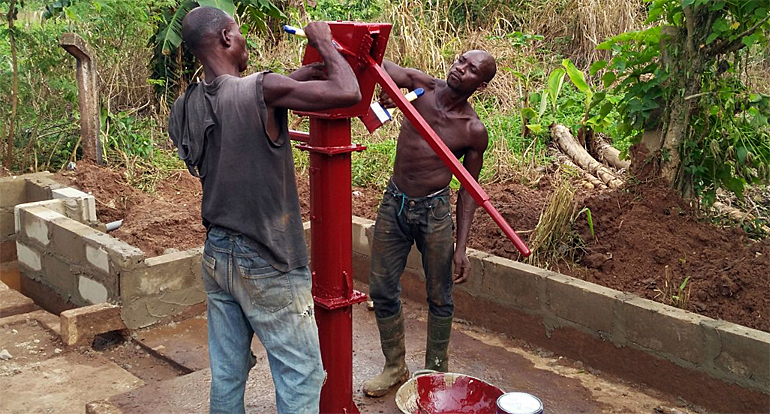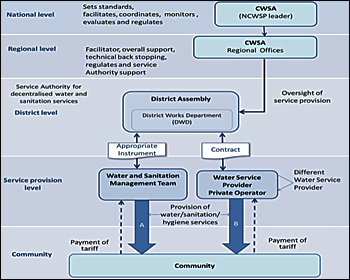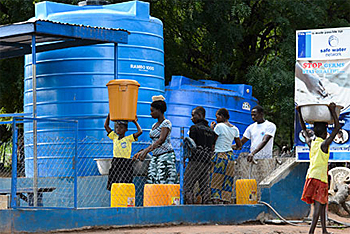IRC study: Maintenance management crucial for improvement of water supply in Ghana

A study by knowledge-focused non-profit organisation IRC Wash and Ghana’s Community Water and Sanitation Agency (CWSA) shows that piped water supply systems in Ghana can be improved by a better management of the maintenance, rather than by a different finance of the maintenance.
One of the main problems adversely affecting small-town water service delivery is the lack of a regular cash-flow for maintenance of the piped distribution scheme.
 Organisation of the water and sanitation sector in Ghana at national, regional and local level. Main parties involved are the Community Water and Sanitation Agency, District Assemblies and the Water and sanitation management teams (WSMTs).
Organisation of the water and sanitation sector in Ghana at national, regional and local level. Main parties involved are the Community Water and Sanitation Agency, District Assemblies and the Water and sanitation management teams (WSMTs).
According to the recent CWSA/IRC study the responsible authorities, such as the local District Assemblies (DAS) and Water and sanitation management teams (WSMTs), have to make the cash-flow for the maintenance more reliable by raising their capacity and by strengthen their management.
The study was conducted in three districts and was supported by the Conrad N. Hilton foundation.
Limited capacity and weak management
The study, which was conducted in the districts of Akatsi South in Volta Region, East Gonja in Northern Region and Kintampo South in Brong Ahafo Region, revealed that the mechanism inherent in the National Community Water and Sanitation Strategy (NCWSS) for addressing CapManEx works for the systems set up in line with it.
The water systems with inadequate mechanisms to address CapManEx were found to be characterized by limited capacity, such as arbitrarily tariff settings, and weak management, such as record keeping and financial management.
 No innovative financing
No innovative financing
The study did not find any innovative mechanisms of financing capital maintenance expenditure for piped schemes in the three districts.
The main sources of finance captured are tariffs, a contribution from District Assemblies and in a few instance grants from donors.
In addition, the study report indicated that none of the water systems had ever approached a bank for loan to address CapManEx, despite the willingness of the financial institutions to provide loans to the piped schemes if WSMTs met their conditions.
Recommendations
To improve small towns water service delivery, the study recommended that:
● CWSA should sensitization of local authorities on the mechanism to address CapManEx and governance in general;
● intensification of monitoring and support on budgeting and tariff setting;
● keep basic requisite recording and operate the mandatory bank accounts to facilitate their access to financial support from the banks when the need arises;
● more transparency and accountability based on district specific requirements and after deeper consultation and community engagement processes;
● more regular monitoring, capacity building and periodic audit of operation and maintenance as well as the financial audit of the systems and its enforcement.
The study notes that the rural water coverage in Ghana is on the increase but many users receive services below the CWSA prescribed basic service level (20L/c/d, within 500m, 95% available).
Download the full study Innovative financing for capital maintenance expenditure in small towns water systems in three districts in Ghana (as a pdf-file).
Read also on this website
● Stockholm World Water Week 2017: Ghana presents ambitious WASH-goals for 2025, 30 August 2017
● IRC supports full WASH coverage start-up initiative in Kenyasi, Ghana, 16 May 2017
● Country: Ghana
● Expertise: Water for all
More information
IRC Wash
The Hague, the Netherlands
+31 70 304 4000
www.ircwash.org



